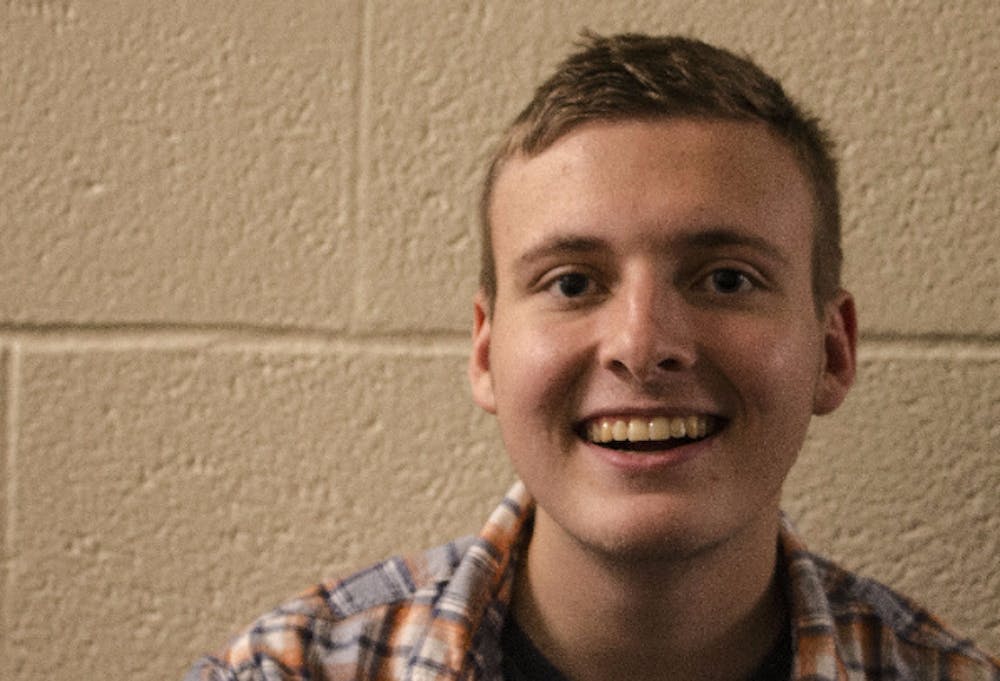Student discusses superbugs and growing human ears on mice
Hidden below ground level on Central Michigan University’s northern campus lies Larzelere Hall terrace and a man whose aspirations are microscopic.
Cedar Springs freshman Gavin Moore, 18, was inspired to pursue pathology when a high school anatomy teacher screened a video that showed the growth of a human ear on a mouse, prompting Moore to consider the possibilities of microscopic forces on human health.
Moore’s career path has been largely shaped by modern scientific breakthroughs, a desire to reach monetary success and the possibility of bacteria ruling the world.
Central Michigan Life sat down with Moore to talk about the inspirations behind his college career and his plan for the future.
CM Life: "Since you turned 18 until now, what has happened?"
Moore: "Quite a lot, I guess — final testing, college and (the) Centralis (Scholarship)."
Tell me more about Gavin.
All I am is schoolwork and stress.
Why?
Because anxiety, schoolwork and stress.
What is your ultimate goal?
My goal is to become a researcher so I can help people and advance society.
How do you hope to advance society?
I hope to become a medical researcher so I can work to make communities and people with other issues that aren’t contributing as much as they could better, and fix that to the best of my capability.
What inspired that?
My junior year of high school.
What happened in your junior year?
My anatomy teacher showed us a video on regenerative medicine and it was the absolute most fascinating thing. It was basically like re-growing different body parts, and they actually used the back of a mouse as the example. They grew a human ear on the back of a mouse, and they showed the process of implanting it and it was the most fascinating thing. I was like, "That’s awesome. I can do that."
Is that the sort of track you’re going down?
As cool as I think that is, I am going into pathology because I think the study of viruses is a more important field right now, especially considering the advancement of superbugs.
Could you explain superbugs a little more?
Because of all of the antibiotics modern first-world countries are on, most bacteria are developing resistances. Right now, we’re in a sort of biological arms race where we need to create antibiotics faster than they can adapt to them, so I hope to do that in a way that they won’t adapt.
Do you have any ideas on how your field could cure this?
There was one example kind of recently. This one girl — I forget what university it was at — but this was within the past couple of months. She developed a polymer where the weird shape of it made it so that when a bacterium absorbed it, (the polymer) sort of ripped apart (the bacteria’s) skin and killed it without a way for it to develop a resistance.
Now, that’s really expensive and impractical, but that kind of shows how future medical science could do this.
Do you think biochemical warfare is possible?
It’s 100 percent possible.
Do you think that people could utilize it with these new superbugs we’re talking about?
Not so much in the field I’m going down. Since the Medieval Ages, people have been throwing plagued cows over walls, so it’s definitely a thing.
Where are you at in your research?
Right now, I am at stage zero of my research. I really just don’t have the class knowledge and all that stuff for what I need for it. I’ve already talked to several professors, and if there’s room in a lab, I already have one lined up for next fall semester.
Do you have any idea about what you’re going to research?
Yes, with (Mallory) Wacker’s lab. She is working on the streptococcus virus.
As in strep throat?
Exactly. Basically, it has a lot of weird interactions with the pathogens that cause inflammation, so my research will be on that. It’s kind of like, how they operate and potentially what we could use in combination with that to better understand how inflammation accosts the body.
Going back to what you said was your junior year. When did this video show up, and what did you do to take action after you saw it?
To be honest, I didn’t have an exact career path at that point in time. I’ve always been pushed to the medical field and all that sort of thing, like, “Be a doctor, make money.” That was halfway through the fall semester, by the way.
There’s your other question. But as far as the action goes, that’s really what made me decide that research would be a better place for me. So it was just, “I’m going to Central, and I’ll do this (kind of thing).”




